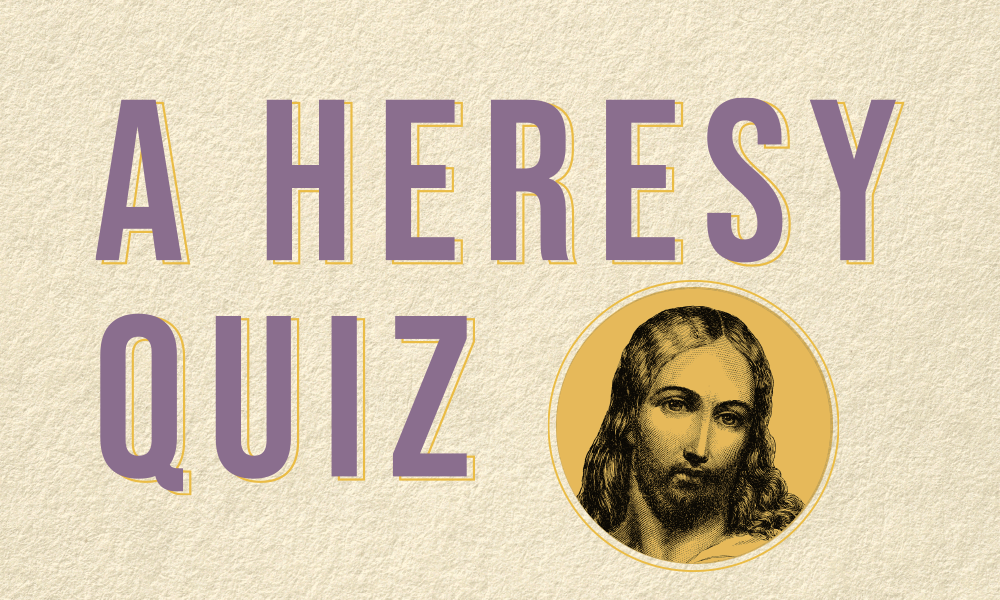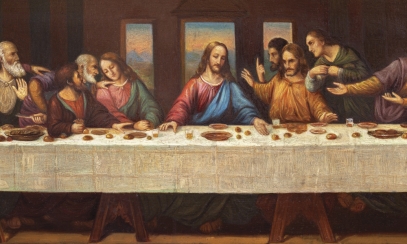
A Heresy Quiz
The word “heresy” is derived from the Greek haireo. Haireo is generally translated to mean “I choose,” but also can mean something closer to “I grasp” or “I seize” or “I take away.” All of these meanings are apt descriptions of what heresy does, i.e., it distorts the truth through the choosing, grasping, seizing and taking away a part of a truth and reducing the whole truth to that part alone.
The word “heresy” is derived from the Greek haireo. Haireo is generally translated to mean “I choose,” but also can mean something closer to “I grasp” or “I seize” or “I take away.” All of these meanings are apt descriptions of what heresy does, i.e., it distorts the truth through the choosing, grasping, seizing and taking away a part of a truth and reducing the whole truth to that part alone.
See how sharp your “heresy hunting” skills are by examining each of the following statements about Jesus Christ. Is the statement “true” or “false”?
1. Jesus Christ once appeared on earth to impart a truth, the knowledge of which leads to salvation, to a select number of followers.
2. The Divine Word is from above; Jesus the man is from below. Mary thus gave birth to a man equal to us, but better in every respect because she gave birth from the Holy Spirit.
3. Jesus became the Christ at his baptism when God the Father adopted him as his beloved Son.
4. God the Father created God the Son, who sanctified the world through God the Spirit.
5. The Word of God, the Divine Mind, took on human flesh and the emotional function of a human soul and dwelt among us.
6. Mary was the mother of the man, Jesus, who was united to the Divine Word through the power of the Holy Spirit.
7. The Word became flesh and dwelt among us as a person, one in divine nature and will.
8. The only begotten Son of God, who is truly both God and Man, works both the divine and the human works, and from one and the same incarnate Word of God proceed indivisibly and inseparably both the divine and the human operations.
The answer key
All the statements on the quiz are false. While there is not enough space to go into a detailed explanation of each of the heresies covered in the quiz, a brief explanation of each will hopefully whet the reader’s appetite to research these heresies on their own.
1. Gnosticism was a system with many variants. However, it generally held that salvation comes through “secret” gnosis (knowledge) and the magic formulas needed to access this gnosis. Consequently, the only sin is ignorance, and there is no need for a savior. Gnosticism also asserted that matter was evil.
2. Docetism derived its name from dokesis (appearance or semblance). It taught that Christ only appeared to be a human. Hence, this heresy denied Christ’s human nature and the Resurrection. Not surprisingly, it arose from Gnostic sects.
3. Adoptionism asserted that Jesus was only a human whom God adopted as a son and endowed with special grace.
4. Arianism argued that the Word made flesh is the first and highest creature – that God created Jesus who had a beginning in time, rather than them being consubstantial. Arianism held that the Logos is not divine (consubstantial with God) because, in part, God cannot be said to suffer.
5. Apollinarianism stated that Christ had a human body and soul, but only a divine mind. It, in essence, maimed Christ’s humanity by divesting it of its noblest attribute, a rational mind/human intellect.
6. Nestorianism denied that Mary was the theotokos, the God-bearer. Mary was the mother of Jesus, the human, not of Christ, the Second Person of the Trinity. Nestorians did not want to acknowledge that God suffered in the flesh.
7. Monophysitism taught the “one nature” (physis) formula, i.e., Jesus’ humanity was completely absorbed into his divinity. This heresy effectively denied Jesus’ human nature.
8. Monotheletism comes from mono (one) and thelema (will). It believed that Jesus is two persons with one divine will so as to avoid division in Christ. Of course, this also meant that Jesus effectively did not have a free human will.
How did you do?
If you answered “true” to any of the quiz statements, you might need a refresher course in the catechism! One of the hallmarks of actual heresy is a “stiff-necked” refusal to turn away from error. It is not the fact of being in error that makes one a heretic. Instead, it is the persistent refusal to accept correction from the Church’s teaching that lands you in this category. The Church makes a distinction between material and formal heresy, and one’s culpability for such. Material heresy is something that is contradictory to the teachings of the Church but the person uttering it doesn’t know that. Formal heresy is a teaching or expression of opinion with a conscious knowledge that it’s contradictory to the teachings of the Church.
Many of you may have gotten most of the answers correct. At the same time, you might not have known precisely why the statement was wrong or the name of the heresy informing the statement. Rather, you just had a feeling that something was off about it, something about the statement simply did not resonate as true. Read the answers at left to find out the specific names of the statements that did not sound quite right.
Doug Culp is the delegate for administration and the secretary for pastoral life for the Catholic Diocese of Lexington.



